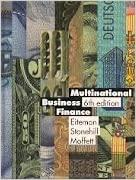Question
1) The misrating of mortgage-backed securities by rating agencies contributed to the financial crisis of 20072009. What recommendations would you make to avoid such mistakes
1) The misrating of mortgage-backed securities by rating agencies contributed to the financial crisis of 20072009. What recommendations would you make to avoid such mistakes in the future?
A) You should abolish ratings altogether as information plays no role in financial markets.
B) You should test models to assess the default risk of the securities in extreme circumstances and you should change the relationship between rating agencies and issuers to avoid conflicts of interest.
C) Because there is so much uncertainty surrounding the value of financial instruments, there is nothing you can do to avoid such mistakes.
D) You should have bond issuers rate their own securities since they are best placed to make an objective assessment.
2) You have $1,000 to invest over an investment horizon of three years. The bond market offers various options. You can buy (i) a sequence of three one-year bonds; or (ii) a three-year bond; The current yield curve tells you that the one-year, two-year, and three-year yields to maturity are 2 percent, 4 percent, and 2.4 percent, respectively. You expect that one-year interest rates will be 4 percent next year and 5 percent the year after that. Assuming annual compounding, compute the return on each of the two investments.
Instructions: Enter your responses rounded to the nearest two decimal places.
A) Expected return for (i) = %
B) Expected return for (ii) = %
3) Suppose the yields on tax-exempt local government bonds initially were below the Treasury yields of the same maturity. Suppose then that your local government, threatened with bankruptcy, decided to tax the interest income on its own bonds as part of an effort to rectify serious budgetary woes. If the tax-exempt status were then removed from the local government bonds, would you expect their yield spreads versus Treasuries to narrow, to disappear, or to change sign?
A) You would expect the spread to be unaffected by the elimination of the tax-exempt status, as this is not a determinant of bond yields.
B) You would expect the spread to disappear. The lower yields on local government bonds versus Treasuries are due to their tax-exempt status.
C) You would expect the spread to narrow. The lower yields on local government bonds versus Treasuries are due to their tax-exempt status. Investors would regard local government bonds as safer than Treasuries and so the spread would remain negative.
D) The loss of tax-exempt status along with the usual risk premium implies that the yields on the local bonds will now be higher than those on Treasuries, so the spread changes sign.
Step by Step Solution
There are 3 Steps involved in it
Step: 1

Get Instant Access to Expert-Tailored Solutions
See step-by-step solutions with expert insights and AI powered tools for academic success
Step: 2

Step: 3

Ace Your Homework with AI
Get the answers you need in no time with our AI-driven, step-by-step assistance
Get Started


